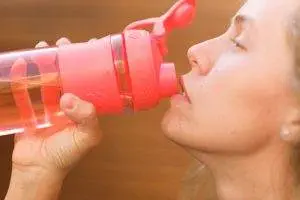By Qineng Tan, L.Ac., Ph.D. and Xiaomei Cai, L.Ac., Ph.D.

Dry mouth? Dry eyes? Joint pain that flares up and then goes away? These can be Sjogren’s disease symptoms. Sjogren’s Syndrome is an autoimmune disease that causes damage to the glands that produce saliva and tears. Acupuncture and TCM provide an alternative Sjogren’s treatment to help relieve Sjogren’s syndrome symptoms.
Sjogren’s autoimmune disease is becoming more common, with an estimated four million Americans affected.
Many people with Sjogren also have another autoimmune disorder, such as rheumatoid arthritis, scleroderma, or lupus. In these cases, it is called Secondary Sjogren’s syndrome.
Anyone can develop Sjogren’s syndrome, but it is much more prevalent among women, and in people over the age of 40.
What causes Sjogren’s disease? As with most autoimmune diseases, medical research has not discovered the exact cause of Sjogren’s syndrome. The immune system, which normally works to get rid of bacteria or other pathogens, sometimes malfunctions and begins attacking healthy cells.
In the case of Sjogren’s, the immune system mistakenly attacks cells of the salivary glands and the glands that produce tears. When these glands become inflamed and/or damaged, they no longer produce enough fluid to keep the eyes and mouth lubricated.
Acupuncture treatment can be a safe and effective way to help relieve symptoms of dry mouth (also known as xerostomia), dry eyes, fatigue, and joint pain.
Top 10 Sjogren’s Syndrome Symptoms

As with other autoimmune disorders, the symptoms of Sjogren’s disease can seem to come and go, or “flare up” periodically. A Sjogren’s flare is a sudden onset of symptoms that occurs when you’ve been feeling better for a while, and then something like work stress or doing too much can suddenly make you feel extreme fatigue and other symptoms.
The most common Sjogren’s Disease symptoms include:
- Dry mouth, dry throat, difficulty swallowing, “cotton mouth”
- Dry eyes, gritty eyes, burning, itchy eyes, sensitivity to light, blurred vision
- Joint pain, stiff joints, swollen joints
- Dry skin, skin rash
- Loss of taste, can’t taste, things taste different
- Dental cavities, oral thrush, oral yeast infections
- Mouth ulcers
- Dry cough, persistent cough
- Vaginal dryness
- Fatigue
Sometimes Sjogren’s can cause peripheral neuropathy, or tingling and numbness in the hands and feet. Some people may experience acid reflux, swollen glands, cognitive difficulties, like poor short term memory, shortness of breath, and trouble sleeping.
Less common but more serious complications of Sjogren’s disease can include a higher risk factor for getting pneumonia, kidney problems, and liver disease, like cirrhosis or hepatitis. In rare cases, people with Sjogren’s syndrome can develop lymphoma (cancer of the lymph nodes).
Medical treatment for Sjogren’s Syndrome is mostly about managing symptoms, so that a person can live comfortably.
Sjogren’s Treatment

Managing Sjogren’s symptoms like dry eyes and joint pain is the primary aim of medical treatment for Sjogren’s.
Dryness is the most common symptom of Sjögren’s, and one of the primary approaches to managing dry eyes and dry mouth involves moisture replacement therapies. Artificial tears and lubricating eye drops help alleviate dry eyes, while saliva substitutes and frequent sips of water can provide relief for dry mouth.
Medications that stimulate saliva production, such as pilocarpine or cevimeline, may be prescribed. These drugs can help improve saliva flow, but they can also cause side effects, like dizziness and headaches.
Nonsteroidal anti-inflammatory drugs (NSAIDs) may be recommended to manage pain and inflammation associated with Sjögren’s syndrome. In more severe cases, corticosteroids, which act as anti-inflammatories, may be prescribed. However, long-term use of steroid medications does, in many cases, cause unwanted side effects, increasing the risk of developing problems like cataracts, osteoporosis, and problems with blood sugar.
Immunosuppressive medications, such as hydroxychloroquine or methotrexate, are often prescribed for autoimmune diseases, to dampen the immune response. These drugs aim to reduce inflammation and alleviate symptoms, particularly in cases where there are complications involving organs like the kidneys or liver.
In cases where joint pain and inflammation are present, disease-modifying antirheumatic drugs (DMARDs) like methotrexate may be considered. These drugs work to modify the course of the disease and manage systemic symptoms.
Acupuncture and Chinese herbal supplements have been shown to work as an effective alternative or adjunct treatment for Sjogren’s disease.
Can Acupuncture Help Sjogren’s Syndrome?

Many diseases and syndromes have a variety of possible symptoms, which show up differently in different people. In TCM, we recognize that sometimes people can have the same sort of disorder, but with different patterns of symptoms, which give us clues about what sort of internal imbalance is causing the disorder. Thus, an acupuncturist will create a unique treatment plan for each individual patient.
According to TCM theory, Sjogren’s disease symptoms can be related to Yin deficiency, and a pattern of dry heat. Acupuncture and herbs can help to nourish and strengthen Yin, and bring more moisture to the organ systems.
In other cases, though, there may be dampness, stasis, or Qi deficiency. Herbs to strengthen the liver and help relieve depressed Qi may be used, and/or herbs to tonify the spleen, to help clear dampness.
One systematic review of clinical trials found that a Chinese herbal formula was superior to Hydroxychloroquine for helping to alleviate Sjogren’s symptoms.
A study comparing patients with Sjogren’s treated with hydroxychloroquine versus those who received acupuncture treatment and herbs found that the group who received TCM treatment for Sjogren’s had an 83% effective rate, versus a 60% effective rate among the people who took the immunosuppressant medication. This study measured saliva and tear production as well as immune system function.
It has been hypothesized that acupuncture treatment has a positive effect on the parasympathetic nervous system, helping promote relaxation and move patients out of a “fight or flight” mode, which, in turn, can help to restore natural salivation and improve appetite.
Another study found that Sjogren’s patients who received acupuncture to help dry eye symptoms reported that they were able to greatly reduce their use of artificial tears after receiving a course of acupuncture, and were still feeling these benefits several months after treatment.
Acupuncture Near Me for Sjogren’s Disease in Los Angeles, West L.A.
Acupuncture and TCM offer holistic treatment for Sogren’s syndrome and other autoimmune diseases. An experienced acupuncture provider can create a personalized health care plan for each patient that addresses their unique needs and situation. Dr. Tan and Dr. Cai at Art of Wellness in West Los Angeles have over 35 years of experience helping patients get relief from symptoms like joint pain and fatigue, and improving their quality of life.
*This article is for education from the perspective of Traditional Chinese Medicine only. The education provided by this article is not approved by FDA to diagnose, prevent, treat and cure human diseases. It should not stop you from consulting with your physician for your medical conditions. Traditional Chinese Medicine is based on Qi, which is an invisible force that usually cannot be observed by modern science. Because science focuses on testing ideas about the natural world with evidence obtained through observation, these aspects of acupuncture can’t be studied by science. Therefore acupuncture and Chinese herbs are often not supported by double-blind, randomized trials, and they are considered alternative medicine therapies in the United States.
